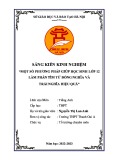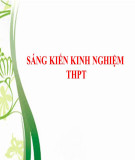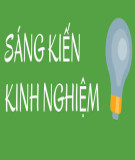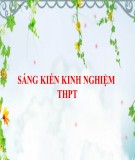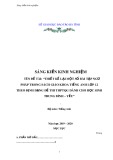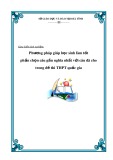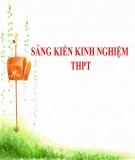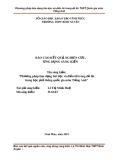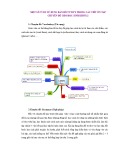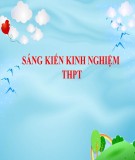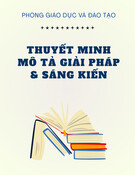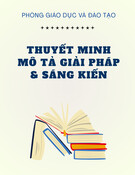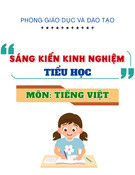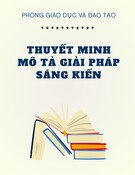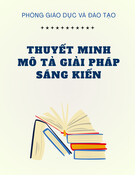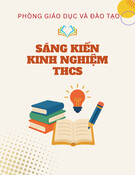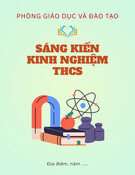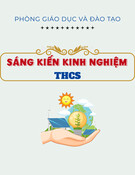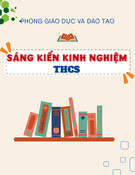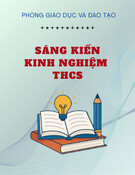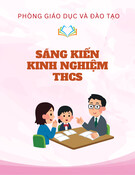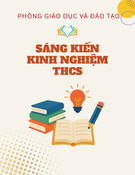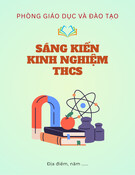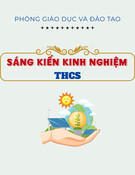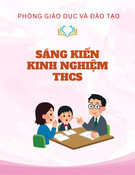
S GIÁO D C VÀ ĐÀO T O THANH HOÁ Ở Ụ Ạ
TR NG THPT YÊN ĐNH 3ƯỜ Ị
SÁNG KI N KINH NGHI MẾ Ệ
APPLYING INTERDISCIPLINARY INTEGRATION
TEACHING METHOD TO TEACHING ENGLISH 12
Ng i th c hi n : Nguy n Văn Longườ ự ệ ễ
Ch c v : T Tr ng Chuyên Mônứ ụ ổ ưở
SKKN thu c môn : Ti ng Anhộ ế

CONTENTS
CONTENTS PAGE
A. PREFACE
I. Reasons for choosing the theme 1
1. Basis of theory 1
2. Basis of practice 1
II. Aims of the research 2
III. Objects of the research 3
IV. Methods of the research 3
B. CONTENTS
1. Background, the driving force of the solution 3
1.1. The Multidisciplinary Integration 3
1.2. Interdisciplinary Integration 4
1.3 Transdisciplinary Integration 4
2. Summary of the lessons in the English textbook 12 4
3. Detailed description of the nature and content of the solution 5
3.1. Differences 5
3.2. The novelty of the solution versus the solution that has been
implemented
5
C. APPLYING THE RESEARCH TO TEACHING 5
1. Integrated lesson plan with Physical Education 5
2. Integrated lesson plans with History and Geography 10
D. RESULTS OF THE RESEARCH 15
E. CONCLUSION 16
2

A - PREFACE
I. REASONS FOR CHOOSING THE THEME :
1. Basis of theory :
It is undeniable that English has become the most popular language in the
world and it is also a popular foreign language in Vietnam as well. At present,
most companies when recruiting all require English proficiency from the
applicants. Therefore, mastering a fluency in English will be of a great
advantage for applying for a job as well as capturing many start - up
opportunities from today's global integration. To keep pace with this common
process requires each student while sitting on high school chairs to attain a
certain level of English to communicate at least at a simple level. Over the past
years, the Ministry of Education and Training has directed the compilation of
many textbooks in the communication approach for students at secondary level.
However, not only do new curriculum and textbooks have higher difficulties,
many new or interesting topics such as Cultural Diversity, Nature in Danger,
Water sports, International Organization, Life in the future…, but they also have
a lot of knowledge related to other cultural subjects such as History, Geography,
Civic Education, Physics, Physical Education and Literature... If the teacher just
only provides students with grammar and vocabulary related to the topic of the
lessons without paying attention to the interdisciplinary integration between the
subjects, the lectures will always become considerably boring and hard to
absorb , students may always feel scared, bored and tired after foreign language
lessons[4]. From the above reasons, as an English teacher with over ten years’
experience, I have continuously been wondering and researching for the
techniques to better the quality of teaching English and I am always anxious to
find which method can make my students feel inspired and have fun with
English lessons so as to improve the quality as well as the effectiveness of my
English lectures. Through my years’ time of teaching English 12 as well as
exchanging, referring to related materials and drawing experiences after each
lecture, I have got an experience initiative entitled " Applying Interdisciplinary
Integration teaching method to teaching English 12 ". This experience is
drawn from my research and my real experimental teaching for many years,
especially in 2016 – 2017 and 2017 – 2018 school years. With this initiative. I
just would like to help students to apply their knowledge of History,
Geography, Literature, Arts and Science ... to learning English, which makes
the lessons more diversified and interesting. Beside that, students are also able
to use their knowledge of other subjects to broaden their vocabulary and
3

knowledge of English. Consequently , they find that learning English is always a
process of continuous interaction among subjects.
2. Basis of practice :
As can be seen, English is a rather difficult subject to students particularly
the rural ones. In the high school English curriculum, there have existed a large
number of inter - unitary lessons with different topics that students have studied
in some other subjects such as Geography, History, Physical Education,
Biology....[5]. Nevertheless, most of English teachers are usually only
concerned about giving explanations to vocabulary, instructions to grammatical
structures for students and asking them to do the tasks in the textbook without
focussing on the use of integrated methods to teach. Hence, this results in low
teaching quality and few students with flying colours. To make it worse,
students increasingly lose their interests in learning English and fail to upgrade
their communicative abilities.
By talking and exchanging with colleagues as well as surveying 160
students in classes 12C1, 12C2, 12C6, 12C7 of Yen Đinh 3 High school, I
noticed that the status of teaching and learning foreign languages is as follows :
In terms of teachers’ side, most of the teachers of the school are highly
qualified, enthusiastic in work, eager to learn ... However, some of them are
timid in innovated teaching methods, do not dare to change or redesign
textbooks, have not found many different methods to refresh the solution. In
particular, a small number of teachers also believe that foreign language
teaching is only teaching vocabulary, structures and guiding students how to do
the tasks and exercises so that students will achieve high results in the exams.
In terms of students, Firstly, the 12th grade students have accessed to
three years of high school program education. They are no wonder strange with
the forms of examination and evaluation that the teachers set. Secondy, they
have deep knowledge of natural resources, environment, society, and political
economy issues both domestically and internationally through such subjects as
Geography, History…[6,7,8,9,10]. Thirdly, in subjects such as Literature,
History, Geography ... they have learned about many subjects integrated in the
lessons. As a result, when it is necessary to combine knowledge of a particular
subject into Foreign Language to solve a problem in the unit, they will not feel
surprised.
According to the survey at the beginning of the year, 65% of students said
that English is a difficult subject, to study this subject well requires students to
learn not only vocabulary and structures but they have also to master other
subjects to integrate the knowledge into English.
From the basis of theory and practice , I find that applying
Interdisciplinary Integration to teaching will help students to develop their
brainstorming, logical thinking and creativity in learning and practical
application. So for myself, in the past few years especially this school year 2017
4

– 2018, I have boldly applied a number of interdisciplinary integrated teaching
solutions to create interests as well as help students know how to use the
knowledge of other subjects such as History, Geography, Physical
Education… to learn English more effectively.
II. AIMS OF THE RESEARCH :
Studying the theoretical issues of integrated teaching and teaching
practice at secondary schools which will serve as a scientific basis for the
application of integrative teaching in foreign language to students in Yen Đinh 3
High school. This teaching method has not only enabled me to lull most of
students to take part in English lessons actively, enthusiatically and creatively
but also creat an exciting atmosphere, raise students’s love for English and other
subjects[2]. This experience initiative has been applied in quite a long time of
my teaching English 12 and I have got considerably hopeful result. Therefore, I
decisively exchange my experience initiative with my collagues.
III. OBJECTS OF THE RESEARCH :
This subject is concerned with ways of applying Interdisciplinary
Integration to teaching lessons of English 12.
IV. METHODS OF THE RESEARCH :
- Using the text - book English 12 to apply to each lesson .
- Reading reference books to improve.
- Referring related knowledge from other subjects such as : History, Geography,
Civil Education, Physics, Physical Education and Literature...
- Using the soft ware POWERPOINT, pictures and other materials.
- Discussing with other teachers.
- Applying in teaching.
- Observing and drawing out experiences.
B - CONTENTS
1. Background, the driving force of the solution :
Integrative teaching is one of the important principles in teaching. This is
considered a modern teaching concept to promote the positiveness of students,
while improving the quality of education in the school[1]. Interdisciplinary
integrated learning is a form of exploration of content, intersperse between
subjects, common concepts and thoughts between subjects which are related to
each other[3]. These parts maybe in different subjects but they support each
other to solve situations, phenomena in life. Integration is possibly understood in
the following ways :
- Multidisciplinary Integration.
- Interdisciplinary Integration.
5

